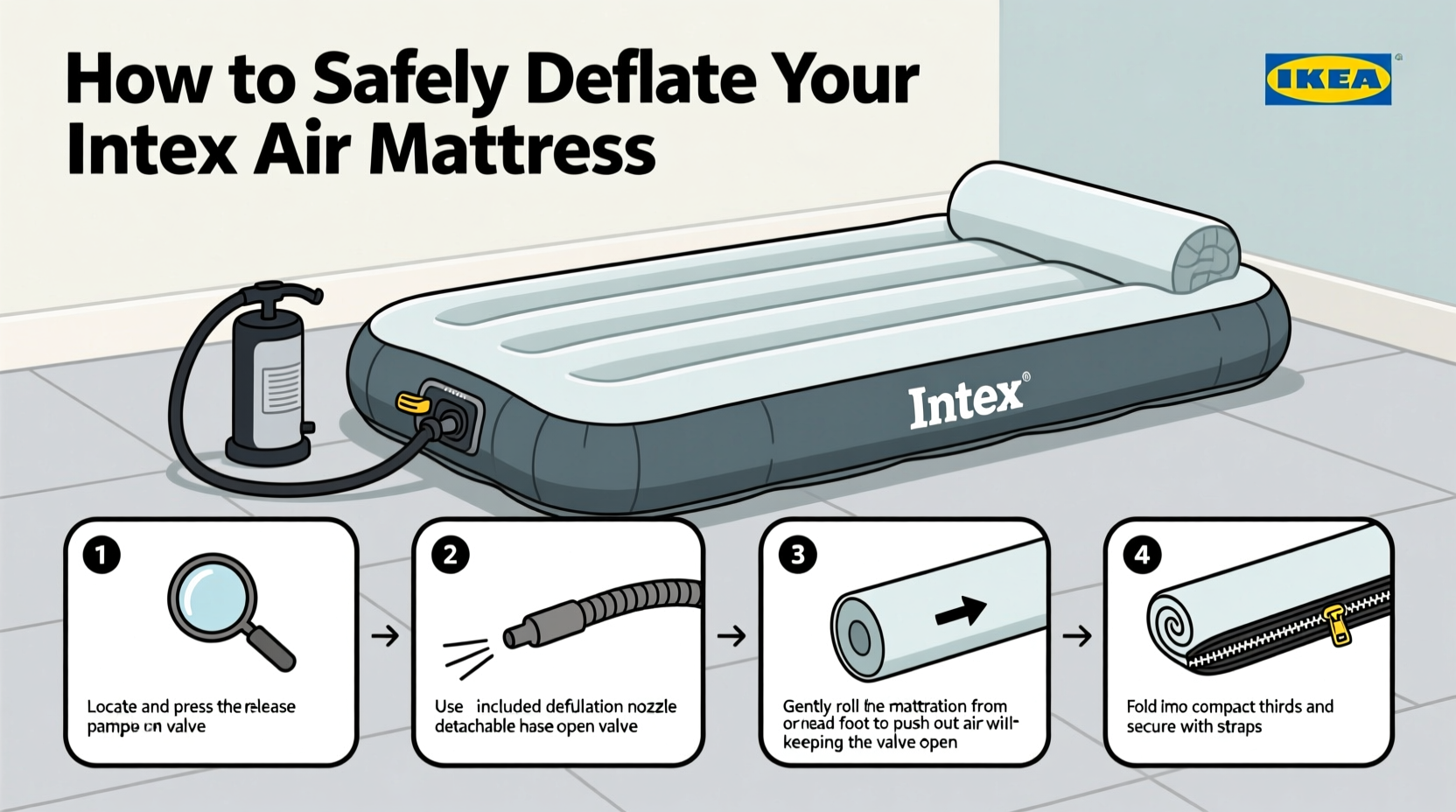Intex air mattresses are a popular choice for guests, camping trips, and temporary sleeping solutions due to their durability, comfort, and convenience. One of the standout features of many Intex models is the built-in electric pump, which simplifies both inflation and deflation. However, even with this feature, improper deflation techniques can lead to prolonged setup times, potential damage to the mattress, or difficulty storing it. This guide provides a detailed, step-by-step approach to deflating your Intex air mattress efficiently and safely—preserving its lifespan while saving you time and effort.
Understanding Your Intex Built-In Pump System

Before deflating your air mattress, it's essential to understand how the built-in pump works. Most Intex models with an integrated pump have a three-position valve: “Inflate,” “Off,” and “Deflate.” The pump uses the same port for both inflating and deflating, switching airflow direction based on the selected setting. When set to “Deflate,” the pump reverses its motor to extract air from the chamber and expel it outward.
Knowing this mechanism helps avoid common mistakes, such as attempting to deflate manually when the pump is designed for active suction. It also emphasizes the importance of proper alignment—ensuring the valve is correctly set prevents motor strain and inefficient air removal.
“Using the built-in pump correctly not only speeds up deflation but also reduces wear on seams and materials over time.” — Carlos Mendez, Consumer Product Engineer
Step-by-Step Guide to Deflating Your Intex Air Mattress
Follow these steps carefully to ensure fast, safe, and complete deflation without damaging your mattress:
- Remove all bedding and weight: Take off sheets, blankets, and any objects on or around the mattress. Pressure from items can restrict airflow and slow down deflation.
- Unplug the power cord (if inflated): If the mattress was recently inflated, disconnect it from the power source before switching modes to prevent electrical issues.
- Locate the pump control switch: Find the pump unit on the side of the mattress. It typically has a small lever or dial labeled with “Inflate,” “Off,” and “Deflate.”
- Switch to “Deflate” mode: Move the selector to the “Deflate” position. You should hear the motor engage and begin pulling air out.
- Press down gently on the surface: As air evacuates, apply light pressure with your hands or body weight to help collapse the mattress evenly. This speeds up the process and prevents trapped pockets of air.
- Roll from foot to head: Once most air is removed, start rolling the mattress tightly from the foot end toward the head, pushing out residual air as you go. Keep the pump running during this phase if possible.
- Turn off and disconnect: Once fully compressed, switch the pump to “Off,” unplug it, and seal the valve securely.
- Store properly: Place the deflated mattress in its carry bag or a dry storage container away from moisture and sharp objects.
Common Mistakes That Slow Down Deflation
Even with a built-in pump, users often make errors that compromise efficiency. Recognizing and avoiding these pitfalls ensures optimal performance:
- Leaving the valve in “Inflate” mode by accident, causing no suction.
- Failing to roll the mattress, leaving air pockets that resist full compression.
- Attempting to deflate a warm mattress immediately after use—heat expands air, making evacuation slower.
- Blocking the pump’s exhaust vent with fabric or furniture, reducing airflow.
- Not closing the valve after deflation, leading to reinflation from ambient air pressure changes.
| Do’s | Don’ts |
|---|---|
| Always switch to “Deflate” mode before powering on | Never force the valve lever; it can break internally |
| Roll the mattress while deflating for faster results | Don’t leave the pump running unattended for more than 15 minutes |
| Check for debris in the valve before use | Don’t store the mattress damp or folded loosely |
| Clean the surface before deflating to reduce dirt transfer | Don’t plug into extension cords; use a direct outlet |
Real-World Example: Efficient Weekend Guest Turnover
Sarah from Denver hosts relatives every other month and uses her Intex air mattress regularly. Initially, she struggled with slow deflation and difficulty fitting the mattress back into its bag. After following the rolling technique while the pump was active, she reduced deflation time from 18 minutes to just under 7. She now stores the mattress in a closet with desiccant packs to prevent mildew, extending its usable life beyond two years—well past the average lifespan reported by other users.
Her key insight? “I used to wait until the last bit of air was gone before rolling. Now I start rolling halfway through deflation, and it makes all the difference.”
Tips for Long-Term Maintenance After Deflation
Proper post-deflation care significantly impacts the longevity of your air mattress. Consider these best practices:
- Inspect seams and surfaces monthly for signs of wear, especially near the pump housing.
- Avoid folding in the same creases repeatedly; rotate the fold pattern occasionally to prevent material fatigue.
- Store vertically or flat—not under heavy items—to maintain structural integrity.
- Keep away from pets and sharp objects, even when packed.
Frequently Asked Questions
How long should it take to deflate an Intex air mattress with the built-in pump?
Most standard Queen-sized Intex air mattresses take between 5 to 10 minutes to fully deflate using the built-in pump, assuming proper technique and no obstructions. Starting the roll midway through deflation can reduce this time by up to 40%.
Can I deflate the mattress without electricity?
Yes, but less efficiently. You can open the valve manually and press or roll the mattress to force air out. However, this method leaves more trapped air and requires greater physical effort. For frequent use, keeping access to a power outlet is recommended.
Why won’t my pump switch to deflation mode?
This usually indicates a mechanical jam or misalignment. Do not force the switch. Instead, unplug the unit, wait 30 seconds, and try again. If the issue persists, consult Intex customer support—forcing the lever may damage internal components.
Final Checklist Before Storage
Use this quick checklist each time you prepare to store your deflated mattress:
- ✅ Pump turned off and unplugged
- ✅ Valve securely closed
- ✅ Mattress completely dry inside and out
- ✅ Rolled tightly and secured with straps or in carry bag
- ✅ Stored in cool, dry place away from sunlight and pests
Conclusion
Deflating your Intex air mattress doesn’t have to be a tedious chore. With the right technique and understanding of the built-in pump system, you can complete the process quickly, safely, and without compromising the mattress’s condition. By incorporating rolling during deflation, maintaining clean valves, and storing correctly, you extend the product’s usability and ensure readiness for next use. Whether you're managing guest rotations, packing for a trip, or reclaiming space at home, mastering this simple routine adds convenience and value to your everyday living.









 浙公网安备
33010002000092号
浙公网安备
33010002000092号 浙B2-20120091-4
浙B2-20120091-4
Comments
No comments yet. Why don't you start the discussion?